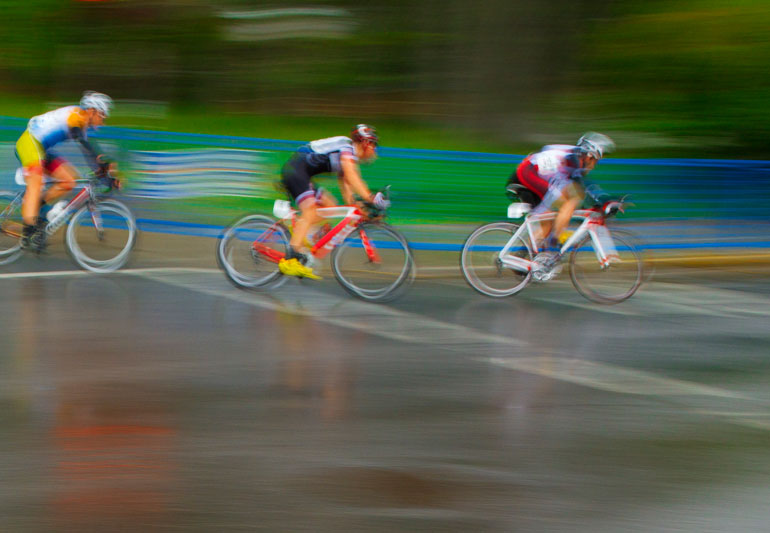

Recovering from a road race is an important component of your overall training plan when you’re an avid cyclist. If you don’t take steps to properly recover from your bike race, you can increase your risk of injury and burnout. And you may even limit your participation in upcoming races.
Matthew Winters, DPT, shares seven tips to help your body recover from a cycling race for optimal performance down the road.
1. Cool down before full stop
After your race ends, take five minutes to continue spinning slowly.
The blood vessels in your legs were expanding during your race. If you stop suddenly, the blood just stays in place like pools of water. This can make you lightheaded and minimizes your body’s ability to get fresh blood in and metabolic waste out.
“You have the joy of being done and you just want to be done,” says Winters. “But it doesn’t end at the finish line. There’s still several hours of recovery time and muscle repair and it all begins with a cool-down process.”
2. Keep moving once you’re off your bike
When your body stops moving following a race, every muscle tightens up and may get stiff and sore. After a five-minute cool-down period where you cycle around slowly, get off your bike, but keep moving.
“You need to keep your body moving a little bit longer instead of plopping yourself down somewhere and calling it a day,” Winters says. “Your muscles need to continue to contract. When you get off your bike, walk for a few minutes.”
3. Keep up the hydration
Don’t forget to drink up and hydrate your body after your race. Dehydration can delay your recovery process.
Some suggestions?
“There are protein-type drinks such as chocolate milk, which is a good recovery drink,” he says. “But plain water or an electrolyte drink is good too. Sport drinks are fine, but only in moderation.”
4. Power your recovery with protein
To kick-start your muscle repair, eat a lot of protein.
“That’s one of the biggest recommendations,” Winters says. “Protein is important for your recovery.”
You can start by having a high-protein snack after your race is over and after you have started to cool down.
Later, be sure to eat a high-protein meal — include foods such as beef, chicken, fish or nuts. A high-protein shake is also fine, he says. This will help decrease any muscle damage and help promote muscle repair and recovery.
5. Try compression socks
Compression wear, including compression socks, can help reduce muscle soreness, fatigue and swelling after an intense bike ride or race.
Since your calf muscles send blood back to your chest, compression socks are highly recommended. Not only can they accelerate this recirculation process but they can also help improve blood oxygen levels, leading to a fuller and faster recovery.
6. Get a massage
Massaging your legs will help push out the fluids carrying waste products during muscle breakdown.
A massage will help improve circulation and allow fresh blood to flow more easily to help repair your muscles. It can also help break up the knots that may form in your body from muscle overuse.
If you can’t get to a massage therapist, try using mini foam rollers or even a couple of tennis balls tucked inside of socks.
“Even something as simple as taking a contrast shower — where you alternate hot water and then cold water — can help,” says Winters. “This contrast of warming up and cooling down creates a pumping-type mechanism.”
7. Reset with plenty of rest
Finally, rest is vital for recovery and muscle repair. It can help heal your body overall. Your muscle-building hormones increase as you sleep, and they’re important for repairing your muscles while you train and after a race.
Winters recommends getting at least seven hours of sleep a night along with a 30-minute power nap during the day, if possible.
more recommended stories
 Red Blood Cells Improve Glucose Tolerance Under Hypoxia
Red Blood Cells Improve Glucose Tolerance Under HypoxiaKey Takeaways for Clinicians Chronic hypoxia.
 Pediatric Crohn’s Disease Microbial Signature Identified
Pediatric Crohn’s Disease Microbial Signature IdentifiedKey Points at a Glance NYU.
 High-Fat Diets Cause Damage to Metabolic Health
High-Fat Diets Cause Damage to Metabolic HealthKey Points Takeaways High-fat and ketogenic.
 Can Too Many Antioxidants Harm Future Offspring?
Can Too Many Antioxidants Harm Future Offspring?Key Takeaways High-dose antioxidant supplementation in.
 Human Antibody Drug Response Prediction Gets an Upgrade
Human Antibody Drug Response Prediction Gets an UpgradeKey Takeaways A new humanized antibody.
 Dietary Melatonin Linked to Depression Risk: New Study
Dietary Melatonin Linked to Depression Risk: New StudyKey Summary Cross-sectional analysis of 8,320.
 Type 2 Diabetes Risk Identified by Blood Metabolites
Type 2 Diabetes Risk Identified by Blood MetabolitesKey Takeaways (Quick Summary) Researchers identified.
 Microglia Neuroinflammation in Binge Drinking
Microglia Neuroinflammation in Binge DrinkingKey Takeaways (Quick Summary for HCPs).
 Durvalumab in Small Cell Lung Cancer: Survival vs Cost
Durvalumab in Small Cell Lung Cancer: Survival vs CostKey Points at a Glance Durvalumab.
 Rising Chagas Parasite Detected in Borderland Kissing Bugs
Rising Chagas Parasite Detected in Borderland Kissing BugsKey Takeaways (At a Glance) Infection.

Leave a Comment